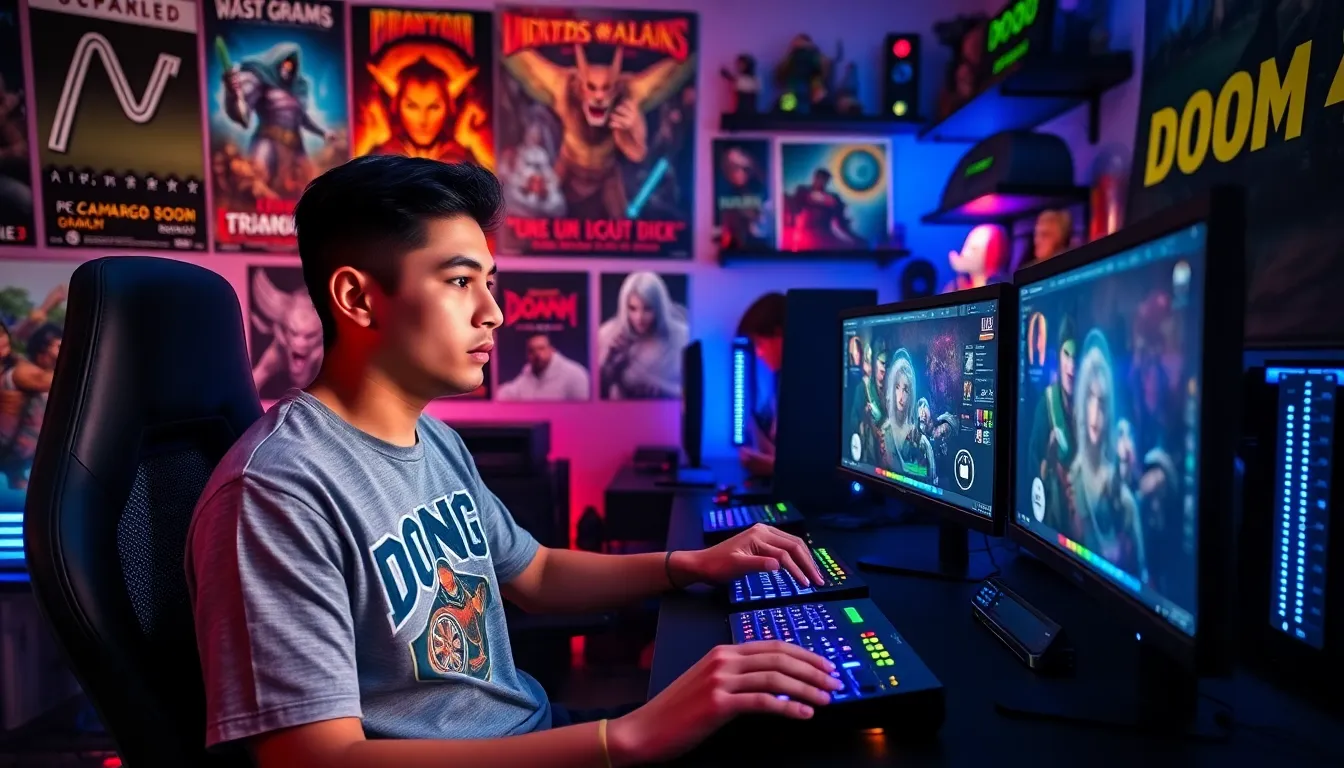Table of Contents
ToggleIn the ever-evolving landscape of digital entertainment, PC gaming stands out as a titan within the industry. Through decades of innovation and growth, it has not only transformed gaming experiences but also shaped the gaming culture itself. From the early days of simplistic graphics to today’s complex virtual worlds, PC gaming has always been at the forefront of technological advancement. This article delves into the evolution of PC gaming, touching on its rich history, current trends, and future possibilities.
The Rise Of PC Gaming

The story of PC gaming begins in the late 1970s and early 1980s, when the first home computers began to emerge. Early titles such as Pong and Space Invaders set the stage for a revolution in entertainment.
Key Milestones In PC Gaming History
One of the most significant milestones was the introduction of the IBM PC in 1981, which allowed users to experience games in a new, more accessible environment. In 1985, the launch of Dungeons & Dragons inspired the creation of role-playing games on PC, solidifying the genre’s popularity. The 1990s brought about the rise of 3D graphics with revolutionary titles like Doom and Quake, which redefined gameplay and player interaction. The introduction of online multiplayer games in the late 90s further expanded the horizons of PC gaming, allowing players to connect and compete globally in real time.
The turn of the millennium saw the rise of gaming communities, fueled by platforms like Steam, which revolutionized how gamers purchased and played games. Each of these key milestones contributed to establishing PCs as the dominant platform for gaming enthusiasts.
The Transition From Consoles to PCs
As technology became more sophisticated, the lines between gaming consoles and PCs began to blur. Today’s gaming experience no longer adheres strictly to the console: rather, many serious gamers have discovered the advantages of switching to PCs.
The ability to upgrade components, install mods, and access a wider variety of games provides significant appeal to the gaming community. PCs offer a greater level of detail and customization, not just with hardware, but in user interfaces and gaming experiences as well. This luxury of personalization is a compelling reason why many gamers are forsaking their consoles in favor of PCs.
Benefits Of Choosing PC Gaming
PC gaming offers several advantages that appeal to both casual and hardcore gamers alike. From powerful performance to extensive game libraries, it caters to a wide audience.
Performance And Customization
One of the most appealing aspects of gaming on PCs is the unparalleled performance and customization options available. Gamers can build their machines according to personal preferences, overclocking CPUs, choosing high-end GPUs, and optimizing cooling systems to enhance performance. This can lead to significantly better graphics and frame rates compared to consoles.
A Vast Library Of Games
Another significant benefit is the vast library of available games. Unlike consoles, which often have limited exclusives, PC gaming offers an array of titles across all genres, including indie games often overlooked by larger platforms. Steam and other digital distribution services frequently host sales, making it economical for gamers to explore various genres and titles without very costly.
Community And Online Play
The online component of PC gaming has fostered a vibrant community that’ll surely captivate anyone interested in gaming. With platforms like Discord and Twitch, players can connect, share experiences, and engage with their favorite titles together.
The Role Of Streaming And Content Creation
Streaming has become a cornerstone of the gaming community, with platforms like Twitch and YouTube enabling gamers to showcase their gameplay, create content, and build personal brands. This trend has led to an upswing in community engagement, where gamers can watch their favorite players live and interact with them in real-time, creating a sense of camaraderie and connection in the gaming universe.
Challenges In The PC Gaming Landscape
Even though its advantages, PC gaming is not without its challenges.
Accessibility And Hardware Costs
One major barrier is the cost of entry. High-performance gaming PCs can be expensive, often requiring several hundred to several thousand dollars for a functional rig. Also, the technical knowledge required to build or upgrade a PC can deter newcomers who may prefer the plug-and-play simplicity of consoles. Accessibility issues extend to those who may not have the space for a dedicated gaming setup or the necessary hardware for optimal performance.
The Future Of PC Gaming
The future of PC gaming looks bright, with emerging technologies poised to transform the landscape even further.
Emerging Technologies And Trends
Trends like VR (Virtual Reality) and AR (Augmented Reality) gaming introduce new experiences that immerse players in ways previously thought impossible. As the technology becomes more accessible, it has the potential to redefine gaming entirely. Also, developments in cloud gaming continue to break down barriers, allowing gamers to play high-quality games without needing powerful hardware. This democratization of gaming could mean that the future is inclusive, allowing more players to enjoy the immersive worlds that PC gaming has to offer.
Conclusion
Summarizing, PC gaming has come a long way from its humble beginnings. Through its evolution, it has evolved into a robust platform with a dedicated community, endless customization possibilities, and a rich library of games. While challenges remain, the continuous growth of technology ensures that the future holds even more exciting developments for PC gamers. As the gaming landscape continues to shift, one thing remains clear: PC gaming will always find ways to adapt and thrive.



